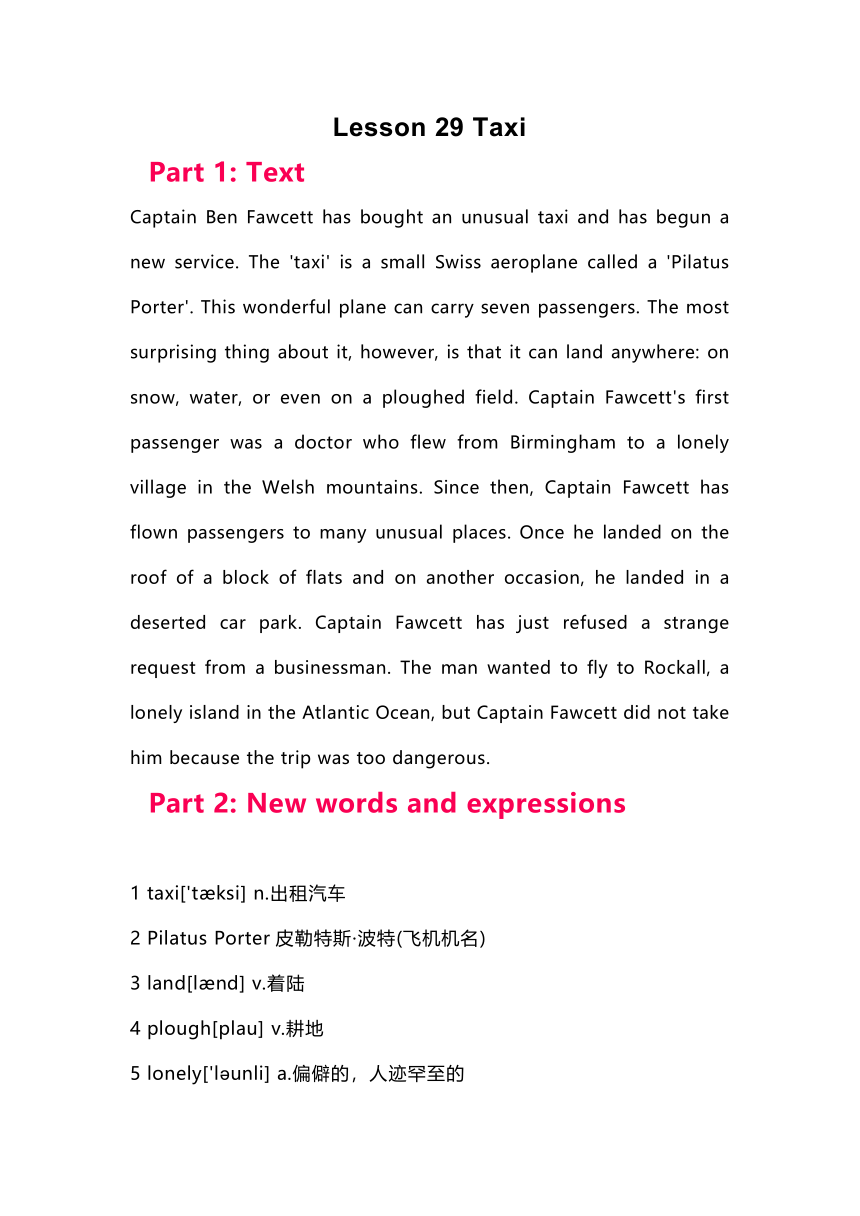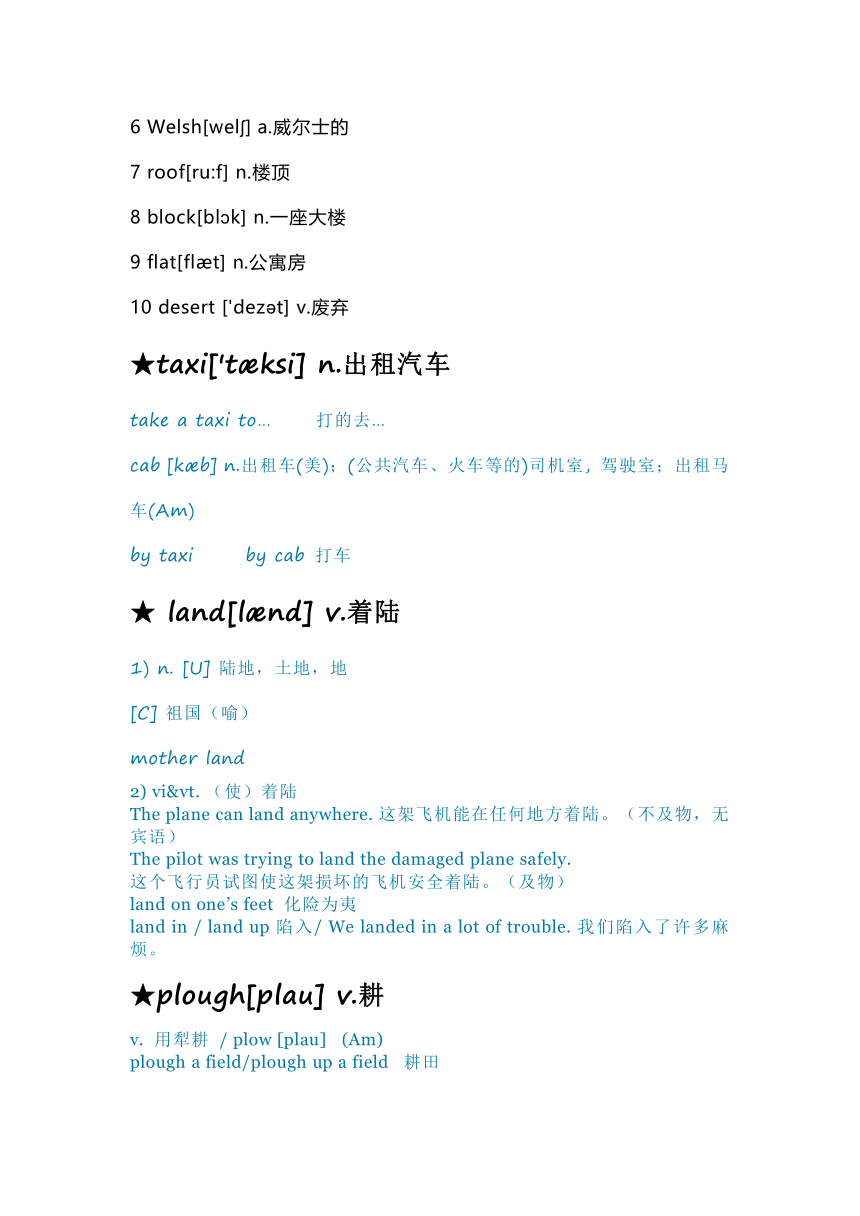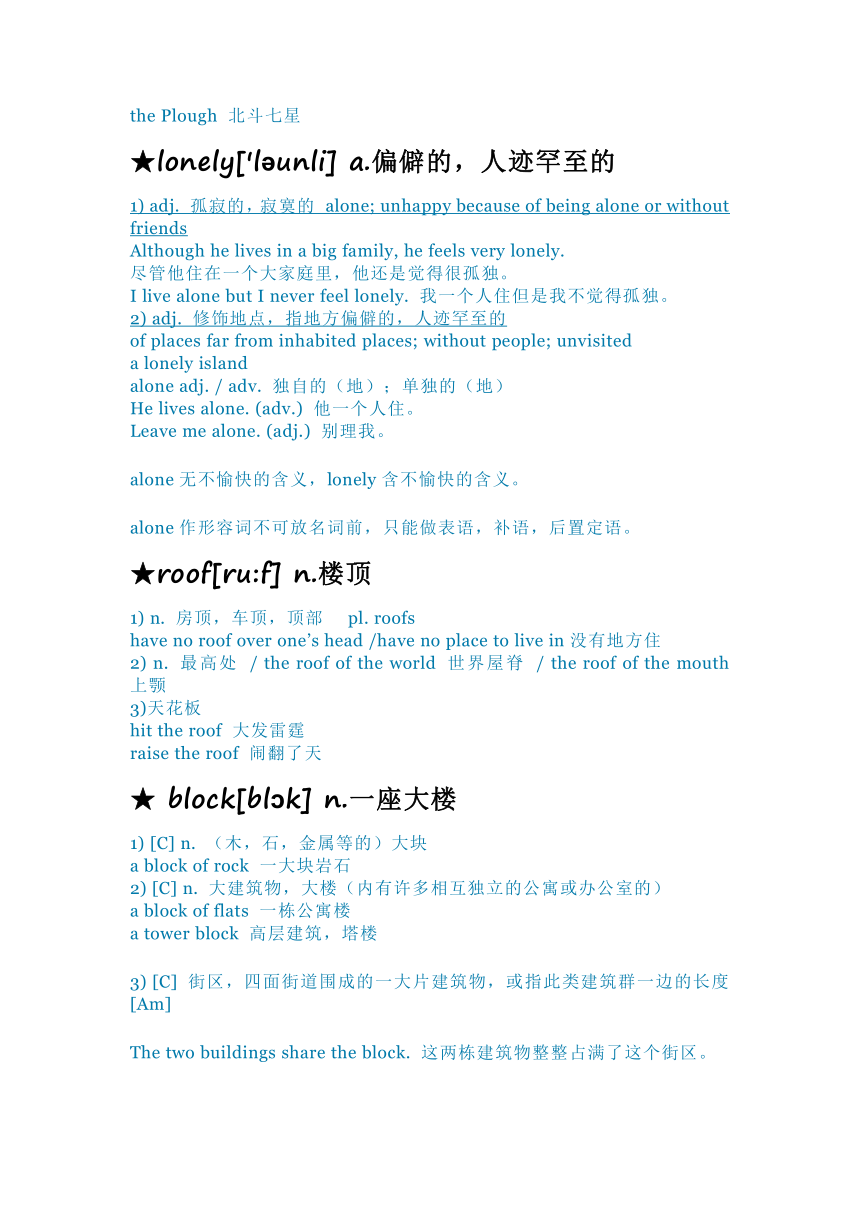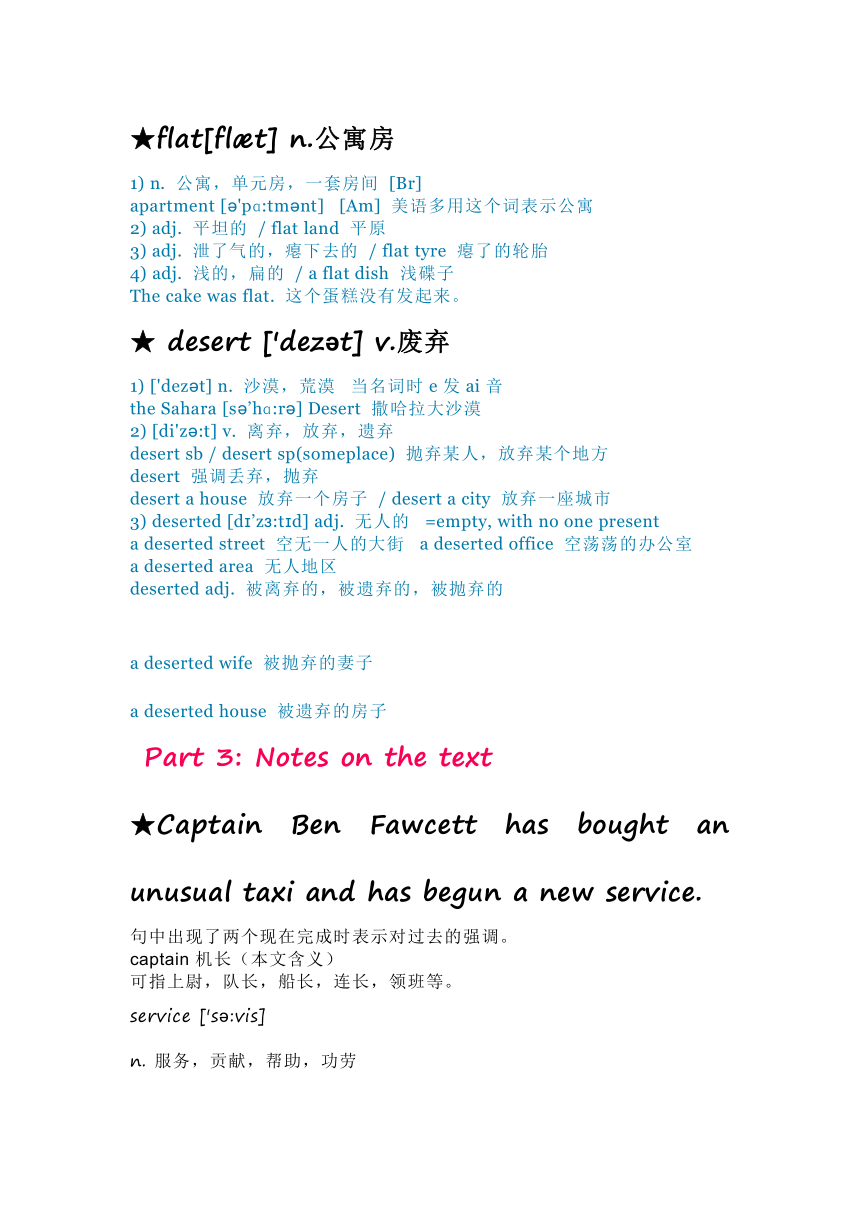新概念英语第二册 Lesson 29 Taxi 讲义
文档属性
| 名称 | 新概念英语第二册 Lesson 29 Taxi 讲义 |  | |
| 格式 | docx | ||
| 文件大小 | 25.4KB | ||
| 资源类型 | 教案 | ||
| 版本资源 | 新概念英语 | ||
| 科目 | 英语 | ||
| 更新时间 | 2023-09-24 22:33:55 | ||
图片预览




文档简介
Lesson 29 Taxi
Part 1: Text
Captain Ben Fawcett has bought an unusual taxi and has begun a new service. The 'taxi' is a small Swiss aeroplane called a 'Pilatus Porter'. This wonderful plane can carry seven passengers. The most surprising thing about it, however, is that it can land anywhere: on snow, water, or even on a ploughed field. Captain Fawcett's first passenger was a doctor who flew from Birmingham to a lonely village in the Welsh mountains. Since then, Captain Fawcett has flown passengers to many unusual places. Once he landed on the roof of a block of flats and on another occasion, he landed in a deserted car park. Captain Fawcett has just refused a strange request from a businessman. The man wanted to fly to Rockall, a lonely island in the Atlantic Ocean, but Captain Fawcett did not take him because the trip was too dangerous.
Part 2: New words and expressions
1 taxi['t ksi] n.出租汽车
2 Pilatus Porter皮勒特斯·波特(飞机机名)
3 land[l nd] v.着陆
4 plough[plau] v.耕地
5 lonely['l unli] a.偏僻的,人迹罕至的
6 Welsh[wel ] a.威尔士的
7 roof[ru:f] n.楼顶
8 block[bl k] n.一座大楼
9 flat[fl t] n.公寓房
10 desert ['dez t] v.废弃
★taxi['t ksi] n.出租汽车
take a taxi to… 打的去…
cab [k b] n.出租车(美);(公共汽车、火车等的)司机室, 驾驶室;出租马车(Am)
by taxi by cab 打车
★ land[l nd] v.着陆
1) n. [U] 陆地,土地,地
[C] 祖国(喻)
mother land
2) vi&vt. (使)着陆
The plane can land anywhere. 这架飞机能在任何地方着陆。(不及物,无宾语)
The pilot was trying to land the damaged plane safely.
这个飞行员试图使这架损坏的飞机安全着陆。(及物)
land on one’s feet 化险为夷
land in / land up 陷入/ We landed in a lot of trouble. 我们陷入了许多麻烦。
★plough[plau] v.耕
v. 用犁耕 / plow [plau] (Am)
plough a field/plough up a field 耕田
the Plough 北斗七星
★lonely['l unli] a.偏僻的,人迹罕至的
1) adj. 孤寂的,寂寞的 alone; unhappy because of being alone or without friends
Although he lives in a big family, he feels very lonely.
尽管他住在一个大家庭里,他还是觉得很孤独。
I live alone but I never feel lonely. 我一个人住但是我不觉得孤独。
2) adj. 修饰地点,指地方偏僻的,人迹罕至的
of places far from inhabited places; without people; unvisited
a lonely island
alone adj. / adv. 独自的(地);单独的(地)
He lives alone. (adv.) 他一个人住。
Leave me alone. (adj.) 别理我。
alone无不愉快的含义,lonely含不愉快的含义。
alone作形容词不可放名词前,只能做表语,补语,后置定语。
★roof[ru:f] n.楼顶
1) n. 房顶,车顶,顶部 pl. roofs
have no roof over one’s head /have no place to live in没有地方住
2) n. 最高处 / the roof of the world 世界屋脊 / the roof of the mouth 上颚
3)天花板
hit the roof 大发雷霆
raise the roof 闹翻了天
★ block[bl k] n.一座大楼
1) [C] n. (木,石,金属等的)大块
a block of rock 一大块岩石
2) [C] n. 大建筑物,大楼(内有许多相互独立的公寓或办公室的)
a block of flats 一栋公寓楼
a tower block 高层建筑,塔楼
3) [C] 街区,四面街道围成的一大片建筑物,或指此类建筑群一边的长度 [Am]
The two buildings share the block. 这两栋建筑物整整占满了这个街区。
★flat[fl t] n.公寓房
1) n. 公寓,单元房,一套房间 [Br]
apartment [ 'pɑ:tm nt] [Am] 美语多用这个词表示公寓
2) adj. 平坦的 / flat land 平原
3) adj. 泄了气的,瘪下去的 / flat tyre 瘪了的轮胎
4) adj. 浅的,扁的 / a flat dish 浅碟子
The cake was flat. 这个蛋糕没有发起来。
★ desert ['dez t] v.废弃
1) ['dez t] n. 沙漠,荒漠 当名词时e发ai音
the Sahara [s ’hɑ:r ] Desert 撒哈拉大沙漠
2) [di'z :t] v. 离弃,放弃,遗弃
desert sb / desert sp(someplace) 抛弃某人,放弃某个地方
desert 强调丢弃,抛弃
desert a house 放弃一个房子 / desert a city 放弃一座城市
3) deserted [d ’z :t d] adj. 无人的 =empty, with no one present
a deserted street 空无一人的大街 a deserted office 空荡荡的办公室
a deserted area 无人地区
deserted adj. 被离弃的,被遗弃的,被抛弃的
a deserted wife 被抛弃的妻子
a deserted house 被遗弃的房子
Part 3: Notes on the text
★Captain Ben Fawcett has bought an unusual taxi and has begun a new service.
句中出现了两个现在完成时表示对过去的强调。
captain 机长(本文含义)
可指上尉,队长,船长,连长,领班等。
service ['s :vis]
n. 服务,贡献,帮助,功劳
at a person’s service 随时为某人服务
★Since then, Captain Fawcett has flown passengers to many unusual places.
since then 从那以后,现在完成时的时间状语。
fly-flew-flown
1) vi. 鸟,飞机等飞
Look, we are flying over the Rocky Mountains. 看,我们在落基山脉上面飞行呢。
2) vt. 驾驶飞机
It seems very difficult to fly a jumbo. 驾驶大型喷气式飞机看起来很难。
jumbo ['d mb u] 大型喷气式飞机
3) Time flies. 光阴似箭。
★Once he landed on the roof of a block of flats and on another occasion, he landed in a deserted car park.
once…on another occasion 一次……还有一次= on one occasion…on another occasionoccasion [ 'kei n] n. 机会,场合
occasional adj 偶尔的
occasionally adv 偶尔地
the Atlantic Ocean 大西洋
the Pacific Ocean 太平洋
the Arctic Ocean 北冰洋
the Indian Ocean 印度洋
Part 4: Grammar&Difficult points
★一般过去时和现在完成时的比较
1)一般过去时表示过去某时发生的动作。
时间状语多为:last year, last month, 3 years ago, in 1994, just now等。
2)现在完成时表示过去发生的某一动作对现在造成的影响和结果;或表示从过去某一时刻开始一直延续到现在,而且还可能继续延续下去的动作;或表示经验。
时间状语多为表示到现在为止的这段时间。
since 1994, for three years, up until now, just, before等。此外,在用already, yet, just ,ever, never这类副词做状语时,常可用现在完成时。
I saw him in 1994. 我在1994年看见他的。
I haven’t seen him since 1994. 我从1994年以后就再也没有见过他了。
I saw him 3 years ago. 我三年前见过他。
I haven’t seen him for 3 years. 我已经三年没有见过他了。
He stayed at this hotel last month. 他上个月住过这家旅馆。
Have you ever stayed at this hotel 你住过这家旅馆吗?
I went abroad last year. 我去年出国了。// 至于与aboard区别,读音很大区别
Up till now, I have never been abroad before. 至今为止,我从没出过国。
★Special Difficulties
1. bring / take / fetch的区别:
bring 带来,由某处带来某物
take 拿走,从某地或某人处带走
fetch [fet ] 取来,去某地,取某物并带回
He brought the book with him when he came to see me. 他来看我的时候把书带来了。
He took the book with him when he left. 他走的时候把书带走了。
I asked him to go to my room and fetch my glasses. 我请他去我的房间取来我的眼镜。
2. very / too的区别:
very 很,非常
I arrived very late but I caught the train. 我到得很迟,但赶上了火车。
too 太,过于
I arrived too late and I missed the train. 我到得太迟,误了火车。
1. When you go to the kitchen, please _____ me a glass of water. [ fetch / bring ]
你到厨房的时候,请帮我拿一杯水。
2.The ball went over the fence and football player asked a boy to _____ it. [ fetch / bring ]
足球飞过了栅栏,运动员叫小男孩去拿回来。
3. When I asked him he _____ to tell me. [ refused / denied ]
当我问他的时候他拒绝回答我。
4. Do you _____ that you have told me a lie [ deny / refuse ]
你否认你说过谎吗?
5.—How are you
—_____ well, thank you. [ too / very ]
你好吗?很好,谢谢。
答案: 1. Bring 2. Fetch 3. Refused 4. Deny 5. Very
Part 5: Homework
1.背诵lesson 29单词&课文
2.Summary writing
3.练习总结课文
Part 1: Text
Captain Ben Fawcett has bought an unusual taxi and has begun a new service. The 'taxi' is a small Swiss aeroplane called a 'Pilatus Porter'. This wonderful plane can carry seven passengers. The most surprising thing about it, however, is that it can land anywhere: on snow, water, or even on a ploughed field. Captain Fawcett's first passenger was a doctor who flew from Birmingham to a lonely village in the Welsh mountains. Since then, Captain Fawcett has flown passengers to many unusual places. Once he landed on the roof of a block of flats and on another occasion, he landed in a deserted car park. Captain Fawcett has just refused a strange request from a businessman. The man wanted to fly to Rockall, a lonely island in the Atlantic Ocean, but Captain Fawcett did not take him because the trip was too dangerous.
Part 2: New words and expressions
1 taxi['t ksi] n.出租汽车
2 Pilatus Porter皮勒特斯·波特(飞机机名)
3 land[l nd] v.着陆
4 plough[plau] v.耕地
5 lonely['l unli] a.偏僻的,人迹罕至的
6 Welsh[wel ] a.威尔士的
7 roof[ru:f] n.楼顶
8 block[bl k] n.一座大楼
9 flat[fl t] n.公寓房
10 desert ['dez t] v.废弃
★taxi['t ksi] n.出租汽车
take a taxi to… 打的去…
cab [k b] n.出租车(美);(公共汽车、火车等的)司机室, 驾驶室;出租马车(Am)
by taxi by cab 打车
★ land[l nd] v.着陆
1) n. [U] 陆地,土地,地
[C] 祖国(喻)
mother land
2) vi&vt. (使)着陆
The plane can land anywhere. 这架飞机能在任何地方着陆。(不及物,无宾语)
The pilot was trying to land the damaged plane safely.
这个飞行员试图使这架损坏的飞机安全着陆。(及物)
land on one’s feet 化险为夷
land in / land up 陷入/ We landed in a lot of trouble. 我们陷入了许多麻烦。
★plough[plau] v.耕
v. 用犁耕 / plow [plau] (Am)
plough a field/plough up a field 耕田
the Plough 北斗七星
★lonely['l unli] a.偏僻的,人迹罕至的
1) adj. 孤寂的,寂寞的 alone; unhappy because of being alone or without friends
Although he lives in a big family, he feels very lonely.
尽管他住在一个大家庭里,他还是觉得很孤独。
I live alone but I never feel lonely. 我一个人住但是我不觉得孤独。
2) adj. 修饰地点,指地方偏僻的,人迹罕至的
of places far from inhabited places; without people; unvisited
a lonely island
alone adj. / adv. 独自的(地);单独的(地)
He lives alone. (adv.) 他一个人住。
Leave me alone. (adj.) 别理我。
alone无不愉快的含义,lonely含不愉快的含义。
alone作形容词不可放名词前,只能做表语,补语,后置定语。
★roof[ru:f] n.楼顶
1) n. 房顶,车顶,顶部 pl. roofs
have no roof over one’s head /have no place to live in没有地方住
2) n. 最高处 / the roof of the world 世界屋脊 / the roof of the mouth 上颚
3)天花板
hit the roof 大发雷霆
raise the roof 闹翻了天
★ block[bl k] n.一座大楼
1) [C] n. (木,石,金属等的)大块
a block of rock 一大块岩石
2) [C] n. 大建筑物,大楼(内有许多相互独立的公寓或办公室的)
a block of flats 一栋公寓楼
a tower block 高层建筑,塔楼
3) [C] 街区,四面街道围成的一大片建筑物,或指此类建筑群一边的长度 [Am]
The two buildings share the block. 这两栋建筑物整整占满了这个街区。
★flat[fl t] n.公寓房
1) n. 公寓,单元房,一套房间 [Br]
apartment [ 'pɑ:tm nt] [Am] 美语多用这个词表示公寓
2) adj. 平坦的 / flat land 平原
3) adj. 泄了气的,瘪下去的 / flat tyre 瘪了的轮胎
4) adj. 浅的,扁的 / a flat dish 浅碟子
The cake was flat. 这个蛋糕没有发起来。
★ desert ['dez t] v.废弃
1) ['dez t] n. 沙漠,荒漠 当名词时e发ai音
the Sahara [s ’hɑ:r ] Desert 撒哈拉大沙漠
2) [di'z :t] v. 离弃,放弃,遗弃
desert sb / desert sp(someplace) 抛弃某人,放弃某个地方
desert 强调丢弃,抛弃
desert a house 放弃一个房子 / desert a city 放弃一座城市
3) deserted [d ’z :t d] adj. 无人的 =empty, with no one present
a deserted street 空无一人的大街 a deserted office 空荡荡的办公室
a deserted area 无人地区
deserted adj. 被离弃的,被遗弃的,被抛弃的
a deserted wife 被抛弃的妻子
a deserted house 被遗弃的房子
Part 3: Notes on the text
★Captain Ben Fawcett has bought an unusual taxi and has begun a new service.
句中出现了两个现在完成时表示对过去的强调。
captain 机长(本文含义)
可指上尉,队长,船长,连长,领班等。
service ['s :vis]
n. 服务,贡献,帮助,功劳
at a person’s service 随时为某人服务
★Since then, Captain Fawcett has flown passengers to many unusual places.
since then 从那以后,现在完成时的时间状语。
fly-flew-flown
1) vi. 鸟,飞机等飞
Look, we are flying over the Rocky Mountains. 看,我们在落基山脉上面飞行呢。
2) vt. 驾驶飞机
It seems very difficult to fly a jumbo. 驾驶大型喷气式飞机看起来很难。
jumbo ['d mb u] 大型喷气式飞机
3) Time flies. 光阴似箭。
★Once he landed on the roof of a block of flats and on another occasion, he landed in a deserted car park.
once…on another occasion 一次……还有一次= on one occasion…on another occasionoccasion [ 'kei n] n. 机会,场合
occasional adj 偶尔的
occasionally adv 偶尔地
the Atlantic Ocean 大西洋
the Pacific Ocean 太平洋
the Arctic Ocean 北冰洋
the Indian Ocean 印度洋
Part 4: Grammar&Difficult points
★一般过去时和现在完成时的比较
1)一般过去时表示过去某时发生的动作。
时间状语多为:last year, last month, 3 years ago, in 1994, just now等。
2)现在完成时表示过去发生的某一动作对现在造成的影响和结果;或表示从过去某一时刻开始一直延续到现在,而且还可能继续延续下去的动作;或表示经验。
时间状语多为表示到现在为止的这段时间。
since 1994, for three years, up until now, just, before等。此外,在用already, yet, just ,ever, never这类副词做状语时,常可用现在完成时。
I saw him in 1994. 我在1994年看见他的。
I haven’t seen him since 1994. 我从1994年以后就再也没有见过他了。
I saw him 3 years ago. 我三年前见过他。
I haven’t seen him for 3 years. 我已经三年没有见过他了。
He stayed at this hotel last month. 他上个月住过这家旅馆。
Have you ever stayed at this hotel 你住过这家旅馆吗?
I went abroad last year. 我去年出国了。// 至于与aboard区别,读音很大区别
Up till now, I have never been abroad before. 至今为止,我从没出过国。
★Special Difficulties
1. bring / take / fetch的区别:
bring 带来,由某处带来某物
take 拿走,从某地或某人处带走
fetch [fet ] 取来,去某地,取某物并带回
He brought the book with him when he came to see me. 他来看我的时候把书带来了。
He took the book with him when he left. 他走的时候把书带走了。
I asked him to go to my room and fetch my glasses. 我请他去我的房间取来我的眼镜。
2. very / too的区别:
very 很,非常
I arrived very late but I caught the train. 我到得很迟,但赶上了火车。
too 太,过于
I arrived too late and I missed the train. 我到得太迟,误了火车。
1. When you go to the kitchen, please _____ me a glass of water. [ fetch / bring ]
你到厨房的时候,请帮我拿一杯水。
2.The ball went over the fence and football player asked a boy to _____ it. [ fetch / bring ]
足球飞过了栅栏,运动员叫小男孩去拿回来。
3. When I asked him he _____ to tell me. [ refused / denied ]
当我问他的时候他拒绝回答我。
4. Do you _____ that you have told me a lie [ deny / refuse ]
你否认你说过谎吗?
5.—How are you
—_____ well, thank you. [ too / very ]
你好吗?很好,谢谢。
答案: 1. Bring 2. Fetch 3. Refused 4. Deny 5. Very
Part 5: Homework
1.背诵lesson 29单词&课文
2.Summary writing
3.练习总结课文
同课章节目录
